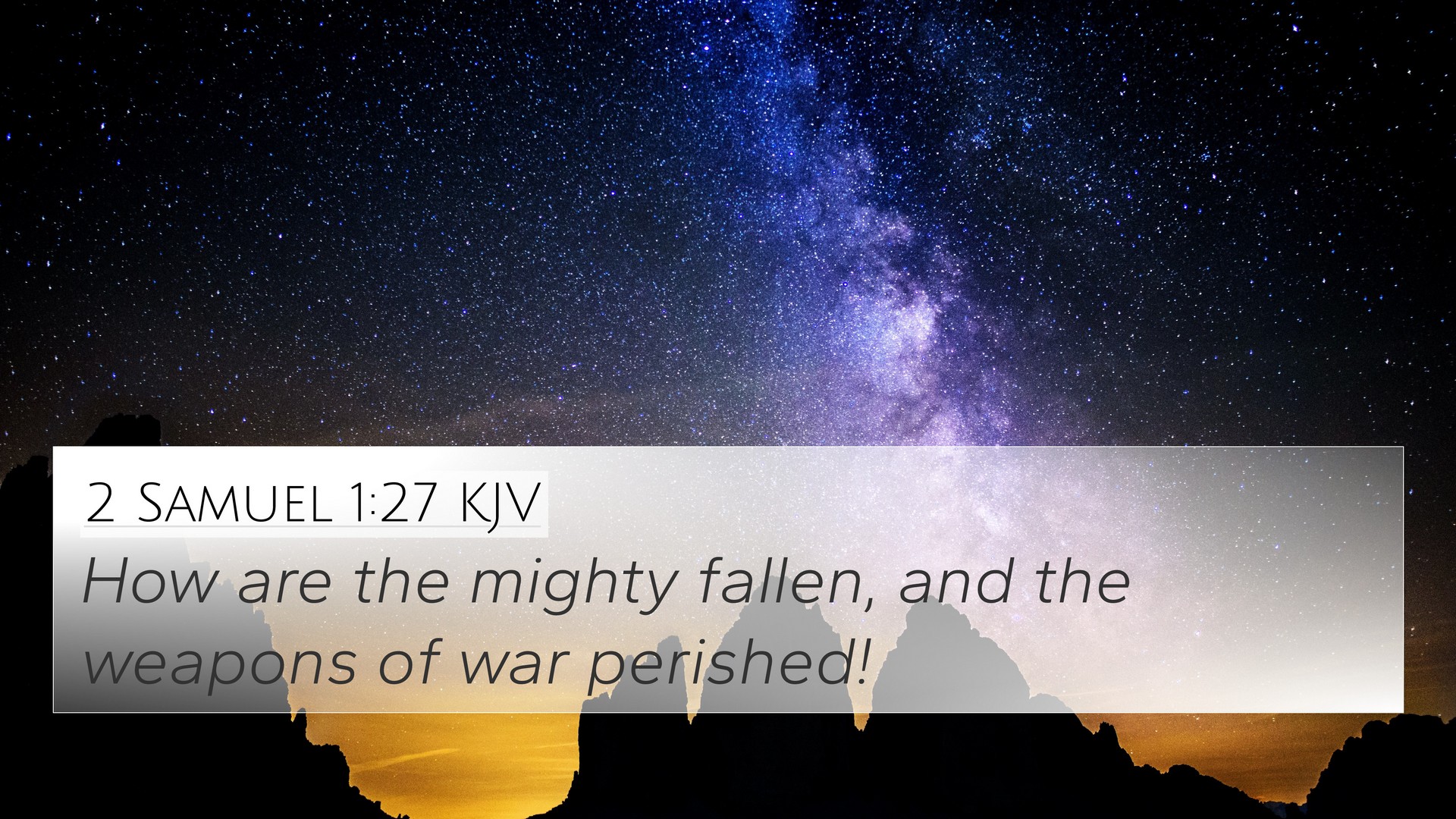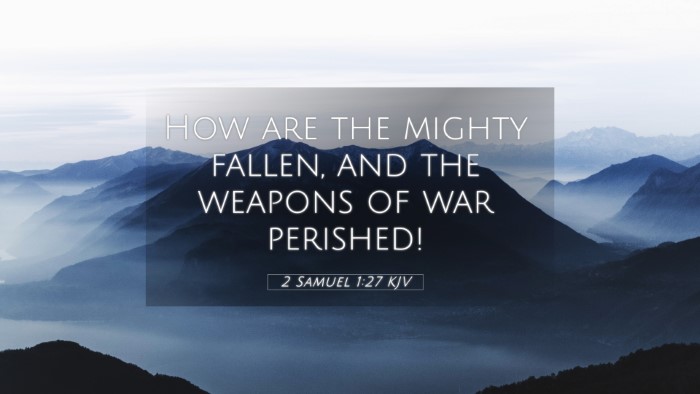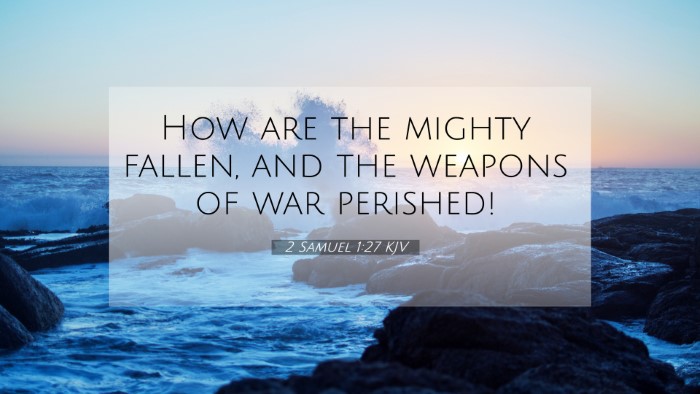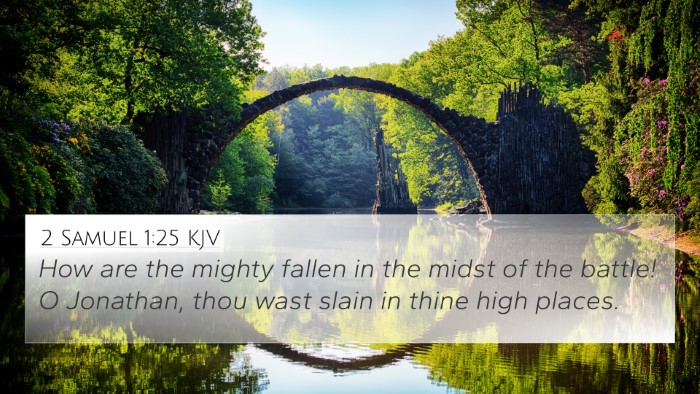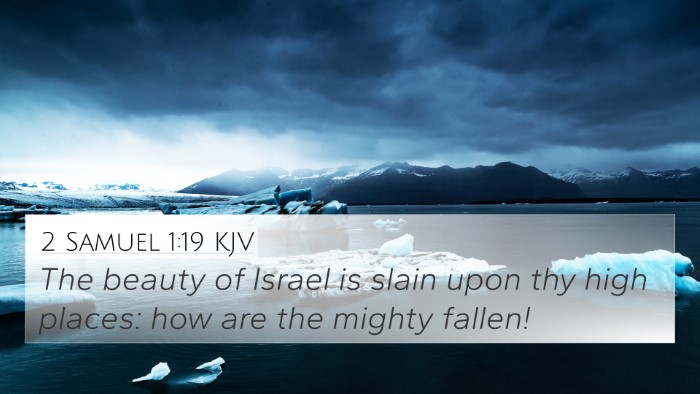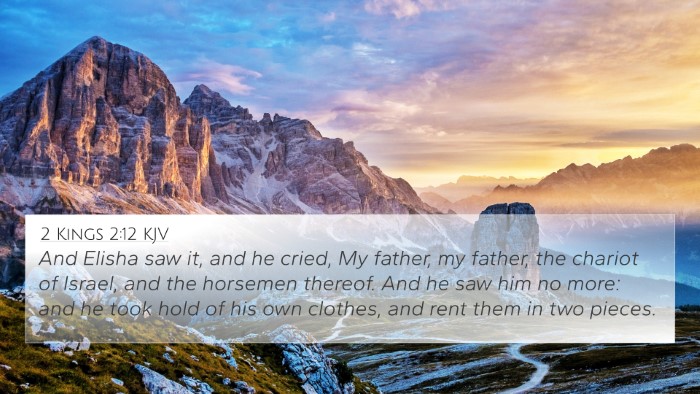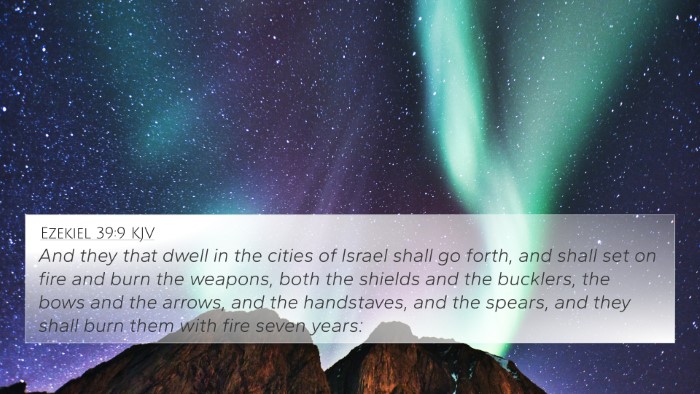Understanding 2 Samuel 1:27
2 Samuel 1:27 states, "How the mighty have fallen, and the weapons of war perished!" This profound lament reflects on the futility of loss, particularly in the context of Israel's fallen leaders, Saul and Jonathan. Through this verse, we are invited to explore themes of grief, the impacts of death, and the fleeting nature of power.
Exegesis of 2 Samuel 1:27
This verse is part of a lamentation delivered by David, mourning the deaths of King Saul and his beloved friend Jonathan. David's words echo a deep sorrow, revealing his respect for the fallen warriors and recognizing their strength in battle.
Insights from Public Domain Commentaries
-
Matthew Henry:
Henry emphasizes the tragedy of losing great leaders. He interprets this verse as David mourning the loss of Saul and Jonathan, who were once mighty in battle. Their death signifies not just a personal loss to David but a momentous event in Israel’s history, stressing how even the mightiest can fall.
-
Albert Barnes:
Barnes highlights the emotional sentiment of the lament. He notes that the phrase captures the essence of victory turned to grief, reflecting on the transformation of warriors into memories as their weapons of war are discarded. His commentary brings forth a discussion about the transient nature of human valor.
-
Adam Clarke:
Clarke delves deeper into the implications of the lament. He points out that the weapons mentioned symbolize the strength and might of those who have fallen. Their perishability serves as a reminder of the inevitability of death, suggesting that no one, regardless of their might, is immune to mortality.
Bible Cross-References
Understanding 2 Samuel 1:27 can be enriched through various cross-references that highlight the interconnectedness of Biblical themes. Here are some relevant Bible verse connections:
- 1 Samuel 18:1-4: The bond between David and Jonathan which highlights friendship amidst tragedy.
- Psalm 9:16: Reflects on God's justice against enemies, relating the theme of fallen leaders.
- Proverbs 11:28: "He who trusts in his riches will fall, but the righteous will flourish like the green leaf," emphasizing that wealth and power are transient.
- Isaiah 14:4-23: Discusses the fall of the mighty, resonating with the lament for Saul.
- Matthew 5:13-14: The metaphor of salt and light illustrates the impact of influential figures in society, akin to the might of Saul and Jonathan.
- Luke 7:32: Relates to the cry over the loss of mighty figures, echoing the tone found in David's lament.
- Revelation 18:2: Speaks of the fall of Babylon, drawing parallels with the downfall of leaders and nations.
Thematic Connections
The lamentation found in 2 Samuel 1:27 speaks volumes about the themes of loss, mortality, and remembrance. It suggests both sorrow for the past and contemplation of the inevitable decline of earthly power.
Application in Personal Life
For individuals exploring this verse, a deeper understanding of its message can foster a reflective approach to grief and loss. Through the themes of vulnerability and the transient nature of life, we are encouraged to cherish relationships and be mindful of how we honor those we've lost.
Reflection and Meditation
In meditation on 2 Samuel 1:27, consider the following:
- How do you recognize and honor the memories of those who have shaped your life?
- In what ways can you view loss through a lens of appreciation for what was, rather than just sorrow for what is gone?
- What lessons can be learned from the fall of great leaders and the impermanence of power?
Conclusion
In summary, 2 Samuel 1:27 serves as a poignant reminder of the fragility of power and the depth of human emotion tied to loss. This reflection, enriched by cross-references and thematic exploration, illuminates the connections between scripture and our own experiences of grief and remembrance. By delving into this verse, we open pathways for dialogue, study, and a deeper appreciation of the interconnected narratives within the Bible, which encourage lessons of humility, gratitude, and community reflection.
Engaging in Bible verse cross-references deepens understanding, providing tools for Bible cross-reference studies and highlighting connections between Bible verses that resonate throughout the Scriptures.
